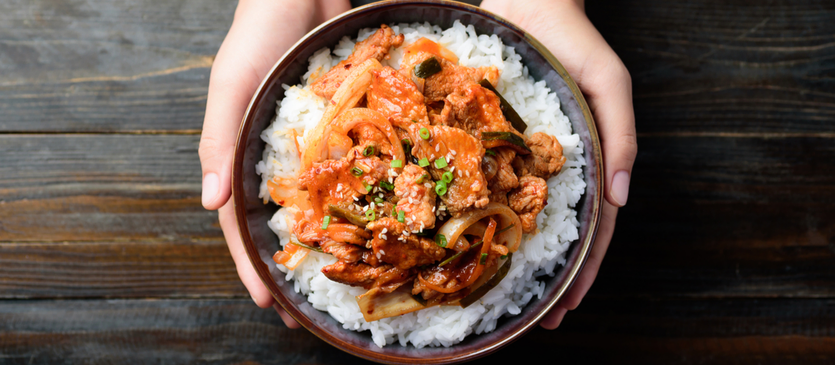The saying – ‘you are what you eat’ – is certainly true as we age. We may be fit and active throughout our lives, yet as we get older, our bodies have different needs. We burn fewer calories and move less as we reach middle-age, so we can’t eat the way we did in our 20s, 30s and 40s. Having a healthy, balanced diet influences how well we feel in body and mind, and ensuring we get the right nutrients becomes especially important in later life.
Life brings many changes with every new life stage, especially to our home life and mealtime routines. If children grow up and move out, or we find ourselves living alone, the regular mealtime pattern naturally changes too, and it might be easy to skip meals or rely on take away or poor-quality food rather than plan and cook something more nutritious and substantial.
Getting the right amount of energy and nutrients from food will help your body cope if you get ill or stressed. Here are four ways to ensure you’re looking after your bodies through the food you eat.
1. Eat Quality Protein Every Day
We all naturally lose muscle mass as we age. Protein helps to make new cells and keep your muscles healthy, so boosting protein intake makes a big difference.
Eating a variety of protein-rich foods each day keeps you fit and strong. Great sources include lean meat, poultry and fish.
When it comes to protein remember quality and quantity matters. Many people eat low-quality proteins such as processed meats or deep-fried fish and chicken. Ditch the fried, fatty meats and choose lean meats, legumes, eggs and even wholegrains like quinoa instead.
Healthy sources of proteins are also rich in other essential nutrients as well. Oily fish like salmon, sardines, trout, fresh and canned tuna are also packed with heart-healthy omega 3 fats. Lean red meat is high in iron which is responsible for carrying oxygen around the body, and vitamin B12 which supports brain health and our nervous system. While fish, eggs and dairy (milk, cheese and yoghurt) are also rich in Calcium and Vitamin D needed for bone health.
We tend to focus on the evening meal to get most of our protein when we really need to spread out our intake throughout the day when we’re up and about using our muscles. Eating beans, eggs and high-protein bread is a simple way of boosting the protein in your diet, especially in the morning.
2. Eat plenty of fresh vegetables
The National Dietary Guidelines says we should eat five serves of vegetables and two serves of fruit each day. Vegetables and fruits contain vital nutrients, vitamins and minerals that are essential for maintaining health and wellbeing. Fruits and vegetables are also packed with gut-friendly fibre to keep you regular and feeling great.
One simple way to boost your veggies is to start with the vegetables as the base of the meal and add your protein and carbohydrates after that. Cauliflower rice, pumpkin gratin, zucchini noodles are creative ways to boost the veg content on your plate.
3. Include a carbohydrate food at each meal
Many weight-loss gurus have told us to cut the carbs, but carbohydrates are a vital source of energy and, more importantly, fibre! Fibre-rich foods help keep your digestive system happy and healthy. And a healthy gut supports a healthy mind and better immunity too. Choose whole grain foods that are high in fibre, legumes and whole grain varieties of bread and cereals, to encourage good bowel health.
Give the “empty calorie” type of sugary or high-fat carbs a miss most days – things like chips, cakes, biscuits, pastries and sugary drinks. These foods should be “sometimes foods”, so consider them a special treat, once or twice a week.
4. Stay Hydrated
Water is a vital part of our diet to maintain overall health – so drink plenty of water or other fluid throughout the day. Eight glasses a day is the ideal target, but you don’t need to simply drink water. You can drink cups of tea, coffee, juice, smoothies or get hydration from fruits and vegetables like watermelon, celery, oranges and cucumbers which have a high-water content, just to name a few.
In the Inner West of Sydney, we are spoiled for choice with fresh fruit, vegetables, meats and artisan bread to create a healthy diet. There are also many local farmers markets where you can get your health food fix:
-
Orange Grove Farmers Market - Every Saturday, 8am to 1pm.
Orange Grove Public School, Cnr Perry Street and Balmain Road, Lilyfield -
Summer Hill Food Market – Open Tuesday – Friday 8.30-5.30pm Saturday 8.30-4pm
162 Old Canterbury Rd, Summer Hill -
Organic Food Markets – Sunday 9-3pm
142 Addison Rd, Marrickville




